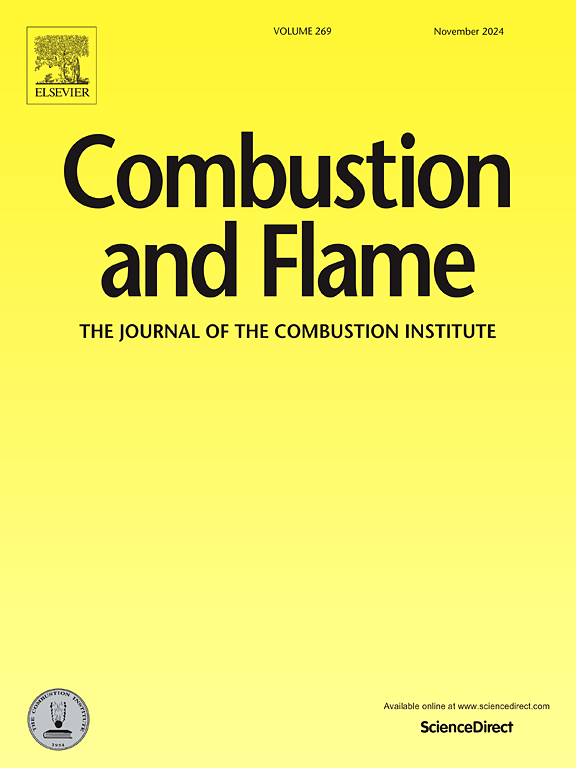Premixed flame behaviors of H2/CH4/C3H8 mixtures in a narrow-gap disk burner and effective Lewis numbers
IF 5.8
2区 工程技术
Q2 ENERGY & FUELS
引用次数: 0
Abstract
Hydrogen combustion is receiving significant interest as a carbon-free energy resource. However, the distinctive combustion characteristics of hydrogen have yet to be explored sufficiently. This study experimentally investigated the effects of hydrogen blending with methane and propane using a narrow-gap disk burner (NGDB). Three representative flame characteristics were considered: the quenching distance, the flame propagation velocity, and the number of cellular structures. It was confirmed that the quenching Peclet number and the number of cellular structures were significantly affected by the addition of hydrogen, primarily due to the Lewis number. However, defining the Lewis number was somewhat ambiguous, especially for multi-component fuel mixtures. Although various effective Lewis numbers have been suggested, their reliability must be adequately assessed. Six representative Lewis numbers were evaluated based on previous studies, and their correlations with flame characteristics were discussed. Conclusively, the previous Lewis numbers were only partly acceptable and had some exceptions. Therefore, a revised effective Lewis number for the hydrogen-blended flames was suggested, using the maximum laminar burning velocity as a new criterion for determining the deficient species, which showed improved correlations with representative flame propagation characteristics.
窄间隙盘式燃烧器中 H2/CH4/C3H8 混合物的预混合火焰行为和有效路易斯数
氢气燃烧作为一种无碳能源,正受到人们的极大关注。然而,氢气的独特燃烧特性仍有待充分探索。本研究使用窄间隙盘式燃烧器(NGDB)对氢气与甲烷和丙烷混合的效果进行了实验研究。研究考虑了三种具有代表性的火焰特征:淬火距离、火焰传播速度和蜂窝结构数量。研究证实,淬火佩克莱特数和蜂窝状结构数量受氢气添加的影响很大,这主要是由于路易斯数的影响。然而,路易斯数的定义有些模糊,特别是对于多组分燃料混合物。虽然已经提出了各种有效的路易斯数,但必须对其可靠性进行充分评估。根据之前的研究,我们评估了六个具有代表性的路易斯数,并讨论了它们与火焰特性的相关性。结果表明,以前的路易斯数只有部分是可以接受的,而且有一些例外情况。因此,针对氢气混合火焰提出了经修订的有效路易斯数,使用最大层流燃烧速度作为确定不足种类的新标准,该路易斯数与代表性火焰传播特性的相关性得到了改善。
本文章由计算机程序翻译,如有差异,请以英文原文为准。
求助全文
约1分钟内获得全文
求助全文
来源期刊

Combustion and Flame
工程技术-工程:化工
CiteScore
9.50
自引率
20.50%
发文量
631
审稿时长
3.8 months
期刊介绍:
The mission of the journal is to publish high quality work from experimental, theoretical, and computational investigations on the fundamentals of combustion phenomena and closely allied matters. While submissions in all pertinent areas are welcomed, past and recent focus of the journal has been on:
Development and validation of reaction kinetics, reduction of reaction mechanisms and modeling of combustion systems, including:
Conventional, alternative and surrogate fuels;
Pollutants;
Particulate and aerosol formation and abatement;
Heterogeneous processes.
Experimental, theoretical, and computational studies of laminar and turbulent combustion phenomena, including:
Premixed and non-premixed flames;
Ignition and extinction phenomena;
Flame propagation;
Flame structure;
Instabilities and swirl;
Flame spread;
Multi-phase reactants.
Advances in diagnostic and computational methods in combustion, including:
Measurement and simulation of scalar and vector properties;
Novel techniques;
State-of-the art applications.
Fundamental investigations of combustion technologies and systems, including:
Internal combustion engines;
Gas turbines;
Small- and large-scale stationary combustion and power generation;
Catalytic combustion;
Combustion synthesis;
Combustion under extreme conditions;
New concepts.
 求助内容:
求助内容: 应助结果提醒方式:
应助结果提醒方式:


